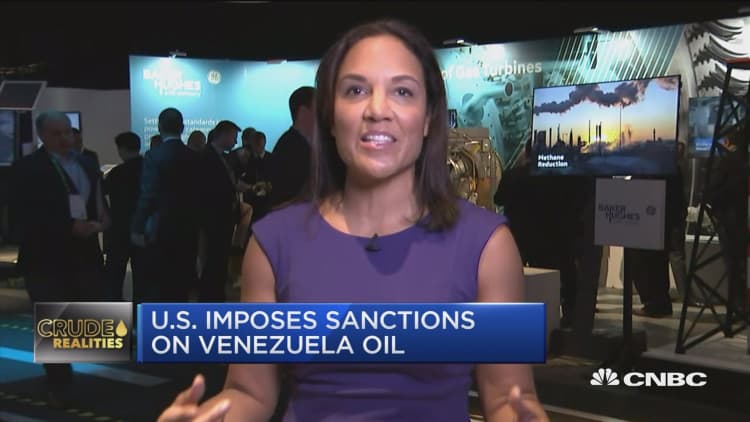Oil prices rebounded on Tuesday from steep losses in the previous session after Washington imposed sanctions on Venezuelan state-owned oil firm PDVSA in a move that may curb the country's crude exports.
Despite the move, which comes as the U.S government looks to pile pressure on President Nicolas Maduro to step down, traders said ample global oil supply and an economic slowdown, especially in China, were keeping crude prices in check.
U.S. West Texas Intermediate crude futures ended Tuesday's session up $1.32, or 2.5 percent, at $53.31 per barrel. WTI fell 3.2 percent in the previous session.
International Brent crude futures rose $1.29, or 2.2 percent, to $61.22 per barrel around 2:30 p.m. ET, after tumbling nearly 2 percent on Monday.

Venezuela has the world's biggest proven oil reserves, but its potential has not been realized due to a lack of investment. The country is also a member of OPEC, which is implementing a supply cut deal.
"The Latin American country is predominantly the producer of heavier crude, exactly what (U.S. Gulf) refiners are thirsty for," PVM said in a note.
"They will now have to turn elsewhere (possibly to Mexico, Saudi Arabia and Iraq) to satisfy their needs for this type of crude, which would inevitably lead to a price spike."
Venezuela's exports fell to little more than 1 million barrels per day in 2018 from 1.6 million bpd in 2017, according to Refinitiv ship tracking data and trade sources.
The United States has been the biggest buyer of Venezuelan oil despite their political differences, taking around half of the country's export volumes, followed by India and China.
Petromatrix estimated that Venezuelan exports will drop by around 500,000 barrels a day under current conditions.
Meanwhile, Libya's biggest oilfield, El Sharara, will remain shut until departure of an armed group occupying the site, the head of National Oil Corp said.

However, global oil supply remains high, largely because of a more than 2 million bpd increase in U.S. crude oil production last year to a record 11.9 million bpd.
"(The) focus will be intensifying on the U.S. inventory data tomorrow, with expectations of a further build in stocks — a larger build will likely see crude taking a further step downwards," Cantor Fitzgerald Europe said in a note.
There are also concerns in the oil industry that crude demand could stutter amid an economic slowdown.
Activity in China's vast manufacturing sector likely shrank for the second straight month in January, a Reuters poll showed.
Warnings from Caterpillar and Nvidia on Monday about weakening demand from China have concerned investors.
— CNBC's Tom DiChristopher contributed to this report.

